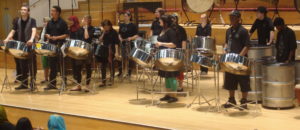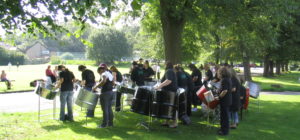Without naming names of bands or leaders or places I would like to tell some stories to exemplify why you would have an etiquette of repertoire.
I t was a decade or two since Young Man X, now a pan player of some years standing, was playing with with a steelband based in one part of Yorkshire. At the same time, he was teaching steelpans at a music centre in another Yorkshire Town. My friend, Y, who told me his story, also played with the band.
On the day in question the band was playing in a little club in the town centre of yet another northern town. Y recalls that these were the happiest performing days that he had had for many a year. Then X came into the club and put on a CD. Y listened with pleasure as he recognised all the tunes that the band knew, thinking that Y must have secretly recorded them at a gig or in practice.
But no, X had taught this band’s tunes to his own class in his own music centre. This band unformed itself on the spot, played their last gig and went their own separate ways. It was suddenly all over, in the blink of an eye, in the playing of a song.
Case Two: In another part of the country the brother of one steelband leader played in his school’s steelband, with a different leader. The school’s band leader, let’s call her Z, spent some time on the arrangement of each tune that they chose, was proud of her arrangements, and proud to show them them off at gigs, choosing songs that marked them out as this school’s band, and not as some other school’s band.
But whatever arrangement she made, whatever songs she chose they would end up in the brother’s band. Sometimes the older brother would come and make notes as his younger sibling learnt. “I know I didn’t write the original songs,” said Z, but what I did with them was my originality, the songs I chose, no one else had chosen before.
Case Three: this was my own music centre band, and happened far back in the mists of time. It often happens in any band, that some people become extra helpful. And at first it is very helpful, like collecting in the music at the end and refiling it. Making cups of tea, then it turns into getting to gigs early, saving you and the van a parking space, then it comes to choosing the actual performance area.

Of course, as time goes by, you become friendly with the students, you want to play to their strengths and let them have a role, if they want or need one. You are there to empower them both musically and personally. Playing music, it’s not just for music. And actually, without the cups of tea, without the help setting up and filing, then leading a band becomes one-way traffic. It is exhausting, draining, enervating. I welcomed and still welcome any help offered.
Now, if a band member has a friend in need of a steelband for her daughter’s birthday or for her church’s summer fair, then we do favours, either freebies or discounted rates. But as a member of MU, I must bear in mind that when amateur groups play for free or ridiculously cheaply, that they taking work from professional musicians, and undercutting them. The amateurs have their day jobs to pay the rent and put food the table; the musicians only have their music.
And so we tend to accept the odd deserving event, but concerning the gig in question, it all got out of hand. This player X asked if we could play for a charity ; Initially I wasn’t able to. And player X didn’t ask again when it turned out I was in Leeds on that day after all, and we did in fact agree to playing for a different local summer fair.
After our set at the fair finished the players got up and left more quickly than usual. The deputy leader and I sat about for a bit, taking tea and buns, and buying plants, and generally discussing how proud we were of how far they had come musically.

Little did we know! I had asked if the drummer if she could use her own kit, save me having to collect and use the music centre van in order to bring my own kit and the tenor basses, but apparently this was not possible, so I went up to work and collected the van, and loaded my own drum kit up for her to use.
So, we were being proud of them . . . .
The following week, let’s call her/him W decided to tell me. Turns out After I said I probably couldn’t do the charity gig, W told the requestee that s/he would speak to me and organise it. Well they they didn’t speak to me; they just organised it. Over the few weeks since agreeing to it the other band members were getting increasingly concerned that the band leaders didn’t know. And one can only presume, it more and more difficult to ‘fess up.
So as We were being proud of them, they waved goodbye, got in their cars including the drummer’s with drum kit inside, changed from the band tee shirts into plain black tops, called themselves by another name, and, minus bass or low chords, they played our entire set. They played my life’s work, going back two decades the songs I had selected, songs I had arranged, songs that I had arranged with some of them in mind, songs that set us apart from other band, my intellectual property. Not something you could put a price on. I felt violated.
It didn’t end well, and, if somebody offers to sort the music or make the tea, these days I think twice.
Oh well, if you insist. Yes please. No sugar.


Howdy I am so grateful I found your site, I really found you
by mistake, while I was searching on Digg for something else, Anyways I am here now and would just like to
say many thanks for a marvelous post and a all round thrilling blog (I also love
the theme/design), I don’t have time to read through it all at the minute but I have
saved it and also included your RSS feeds, so when I have time I will be back to read
a lot more, Please do keep up the superb b. http://www.bigdaddysorlando.com/